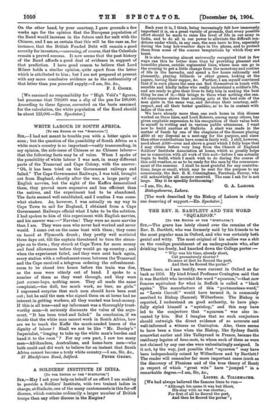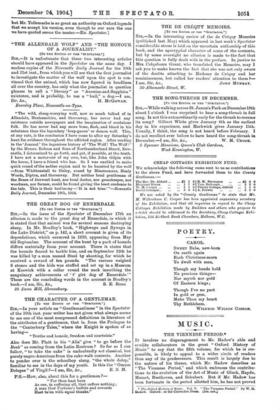THE REV. R. BARTLETT AND THE WORD " SQUARSON."
[To THE EDITOR OF THE " SPECTATOR."' Sin,—The grave has lately closed over the remains of the Rev. R. Bartlett, who was formerly said by his friends to be the most popular man in Oxford, and who was certainly both genial and witty. The most original of his sallies was a skit on the condign punishment of an undergraduate who, after
drinking too freely, had knocked down the College porter :—
" Why was his time, already short,
Cut prematurely shorter ?
Because at first he floored the port,
And then he floored the porter."
These lines, as I can testify, were current in Oxford as far back as 1856. My kind friend Professor Conington said that it was Bartlett who invented the word " squarson,"—that now famous equivalent for what in Suffolk is called a " black squire." The manufacture of this "portmanteau-word," as " Lewis Carroll " would have termed it, is commonly
ascribed to Bishop (Samuel) Wilberforce. The Bishop is reported, I understand on good authority, to have play- fully styled himself a " squishop," and this may have led to the conjecture that " squarson " was also in- vented by him. But I imagine that no such conjecture
should outweigh the direct evidence of so accurate and well-informed a witness as Conington. Also, there seems to have been a time when the Bishop, like Sydney Smith somewhat earlier and like Talleyrand in France, became the residuary legatee of bons-mots, to whom such of them as were not claimed by any one else were unhesitatingly assigned. Is it not, by the way, just possible that " squarson " may have been independently coined by Wilberforce and by Bartlett? The reader will remember far more important cases (such as the discovery of Fluxion and of the true theory of Rent) in respect of which " great wits " have "jumped " in a remarkable degree.—I am, Sir, &c.,
LIONEL A. TOLLEHACHE.
"Although his name it was but Short, His stay with us was shorter ; For first of all he floored the port,
And then he floored the porter";
but Mr. Tollemache is so great an authority on Oxford legends that we accept his version, even though to our ears the one we have quoted seems the neater.—ED. Spectator.1



































 Previous page
Previous page